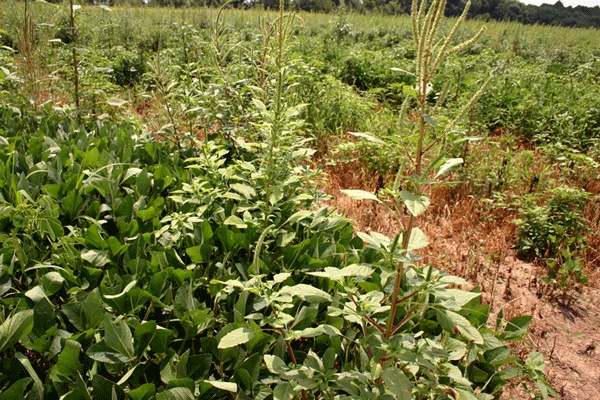
Tennessee Valley weed resistance conference scheduled
• The conference is a response to the increasing spread of Roundup-resistant horseweed and Palmer pigweed throughout northern Alabama this year.• The main focus of this conference is to connect producers with the people who have had first-hand experience with these weeds, including researchers, consultants and farmers.• The conference was inspired by numerous discussions with growers and crop consultants who have seen this weed resistance spread across other areas in the southern United States.
October 28, 2010

A resistant weed conference will be held Dec. 2 to apprise north Alabama row-crop producers about two herbicide-resistant weeds that pose an increasingly serious threat to row-crop farming.
The meeting will be held at the Aerospace Building at Calhoun Community College in Decatur beginning at 8:30 a.m. with registration and exhibits.
Lunch will be provided. The conference will conclude at 2:30 p.m., though the exhibit area with remain open afterward.
The conference is a response to the increasing spread of Roundup-resistant horseweed and Palmer pigweed throughout northern Alabama this year, says Charles Burmester, an Alabama Cooperative Extension System agronomist who is planning and organizing the meeting.
Speakers will discuss how weed resistance occurs, how it spreads and how it can be managed.
"The main focus of this conference is to connect producers with the people who have had first-hand experience with these weeds, including researchers, consultants and farmers," Burmester says.
The exhibit area will feature chemical, seed and manufacturing representatives who can acquaint growers with the latest product information and technologies available for controlling resistant weeds.
Burmester says the conference was inspired by numerous discussions with growers and crop consultants who have seen this weed resistance spread across other areas in the southern United States.
"What I've gathered is that next year will probably be the key year in maintaining control of the resistant Palmer pigweed we found scattered across northern Alabama this year," he says. "Almost everyone has mentioned they wish they had been more proactive when they first saw the resistance starting.
"The one thing we want to drive home with the conference is the importance of staying proactive — to stay a few steps ahead of these resistant weeds. If we don't, we could very well be plowing up fields next year because we can't control the weeds."
Early in the day, Michael Patterson, Alabama Extension weed scientist, will provide an overview of how horseweed and Palmer pigweed can be identified and also how it has spread throughout the Southeast.
Following Patterson's remarks, Andrew Price, a plant physiologist with the U.S. Department of Agriculture's Agricultural Research Service, will discuss how weed resistance occurs, spreads and how it can be managed.
Tennessee experience
Bob Hayes, a plant science professor with the University of Tennessee, will give an overview on what has been learned about Palmer pigweed and horseweed control in Tennessee.
The morning program will conclude with a farmer and consultant panel discussion on these weed-resistant problems, focusing on what is working and what they would do differently if resistant weeds were just moving into their areas.
Following lunch, the Alabama Department of Agriculture's Dalton Brown and Glenn Bell will discuss new pesticide and certification options.
John Fulton, an Alabama Extension specialist and Auburn University associate professor of biosystems engineering, will outline ways that precision agricultural techniques can be used to enhance herbicide efficiency.
Concluding the conference, Bill Puckett, director of the Alabama Natural Resources Conservation Service will discuss the effects of herbicide resistance on conservation programs.
A question and answer session will follow.
Burmester says one of the more upbeat presentations of the day will be reserved for lunch. Long-time area producer Hollis Isbell will talk about how farmers have faced similar challenges in the past and how they have responded.
Conference sponsors include Auburn University, the Alabama Cooperative Extension System, the Alabama Agricultural Experiment Station, the University of Tennessee, the Alabama Natural Resource Conservation Service, the Alabama Department of Agriculture and the U.S. Department of Agriculture's Agricultural Research Service.
The conference has been approved for pesticide certification and certified crop adviser points.
The conference is free and open to the public. More information is available at the Alabama Crops website, http://www.alabamacrops.com, and Alabama Precision Agriculture Online, http://www.alabamaprecisionagonline.com.
Also contact Charles Burmester at (256) 353-8702, ext. 14, or e-mail him at [email protected].
You May Also Like



